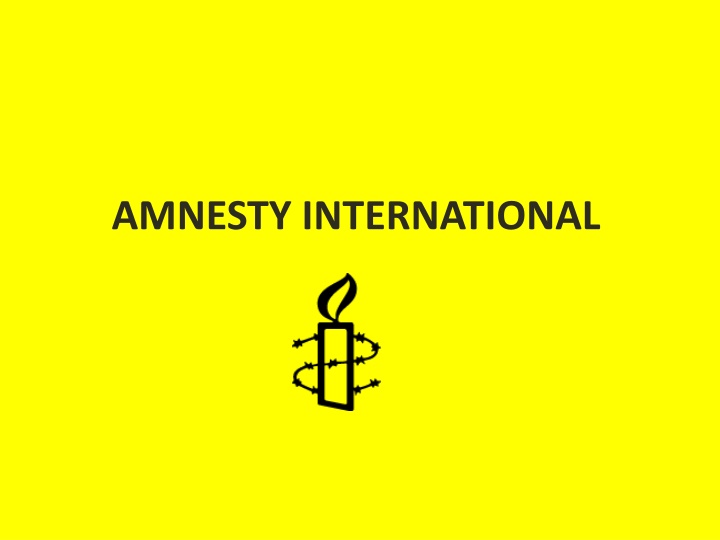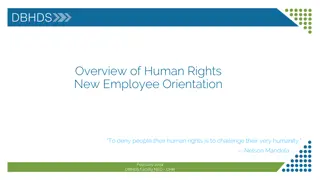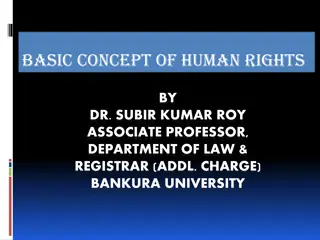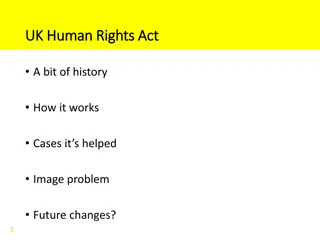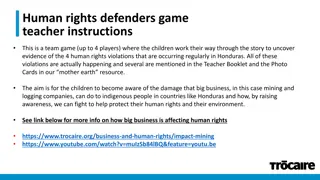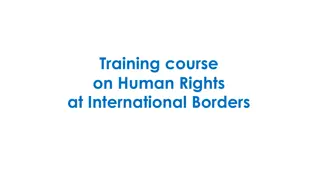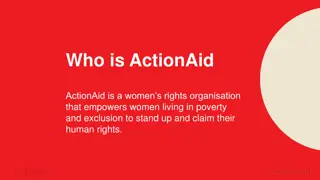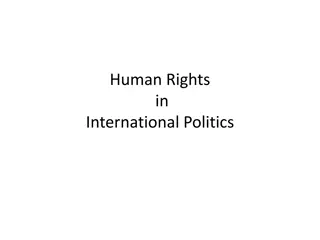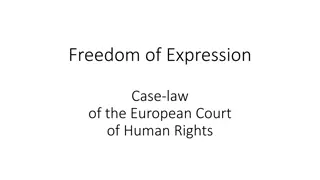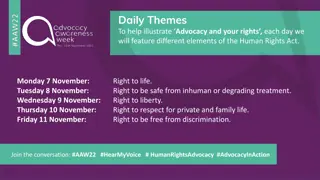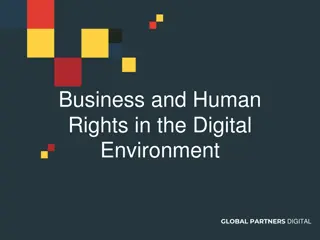Empowering Students for Human Rights Action
Explore the transformative learning theories of Paulo Freire and Jack Mezirow in the context of student-led action, with a focus on developing critical thinking, conscientization, and praxis. Learn about the role of education in fostering active participation, challenging oppressive systems, and promoting meaningful change, including opportunities for action with Amnesty International. Discover various types of actions in schools and consider curriculum links to cultivate values of active citizenship. Reflect on the impact of actions and opportunities for growth and connection.
Uploaded on Oct 01, 2024 | 1 Views
Download Presentation

Please find below an Image/Link to download the presentation.
The content on the website is provided AS IS for your information and personal use only. It may not be sold, licensed, or shared on other websites without obtaining consent from the author.If you encounter any issues during the download, it is possible that the publisher has removed the file from their server.
You are allowed to download the files provided on this website for personal or commercial use, subject to the condition that they are used lawfully. All files are the property of their respective owners.
The content on the website is provided AS IS for your information and personal use only. It may not be sold, licensed, or shared on other websites without obtaining consent from the author.
E N D
Presentation Transcript
logo Taking Meaningful Action In this workshop we will explore: Theorists Paulo Freire and Jack Mezirow Opportunities and challenges regarding student action Inspiring examples of student-led action Tools for planning actions Ideas for how to reflect and evaluate Opportunities for action with Amnesty International Human rights are inscribed in the hearts of people; they were there long before lawmakers drafted their first proclamation. Mary Robinson, High Commissioner for Human Rights (1997 2002)
logo Jack Mezirow Learning process: Changes to habits of mind and points of view. Can include a disorientating dilemma or interactions/dialogue/critical thinking opportunities/actions that allow us to step outside of our habitual perspectives. Transformative learning: About a change to a way of knowing, therefore it is an epistemological change and not just change in behaviour or accumulation of more knowledge. Action: Action shouldn't just happen at the end of learning; action and learning are inseparable. Transformations may be epochal sudden major reorientations in habit of mind or cumulative, a progressive sequence of insights resulting in changes in point of view Paulo Freire Critical Thinking: People can make things happen rather than accept what happens to them. The aim to encourage active participation in social and political life and challenge apathy, indoctrination, and prejudice. Conscientisation: Critical consciousness is a form of emancipatory learning the focus is on root causes rather than symptoms in order to challenge oppressive systems. Praxis: Reflection and action leading to change. Education is part of a process of transformation linked to affirmative collective action. It is a farce to affirm that men are people and thus should be free, yet to do nothing tangible to make this affirmation a reality.
logo Learning & connection - issues, stories, me and the world Action - How will we achieve the change we want? Reflection - What was the impact of our actions? How did we grow and change?
logo Action in Schools Types of action: Awareness raising / Creative / Environmental / Lobbying & Political / Community & Volunteering / Fundraising / Sports & Events / Research and Surveys / Debating and Dialogue / Online / Direct Street Action What is already happening in your schools? What are the curriculum links? Where are the gaps? What are the challenges to exploring different actions?
logo Action and the Curriculum Junior Cycle CSPE, Geography, English, Art, Business, Maths Key skills Statements of Learning: values what it means to be an active citizen, with rights and responsibilities in local and wider contexts Senior Cycle Politics and Society Citizenship Action Project Key Skills Geography, English, Art, Business, Maths
logo Creative Action!
logo Political and Protest Action
logo Community & Environmental Action
logo Solidarity Action
What is the goal of ? Our global campaign goal is for Human Rights Defenders (HRDs) to be empowered, safe and supported, alongside thousands who are inspired to act with them against injustice.
How can we be BRAVE? Me How can I be BRAVE in my life? My community - who is BRAVE in your community? Would you like to invite anyone to your school to talk about the work they do standing up for people s rights? They might defend rights on issues such as: Housing / Traveller Rights / Women s Rights / Children s Rights My country If more County Councils and Governments around the world publicly acknowledge the work of Human Rights Defenders it will increase global awareness of the risks people have to take to protect their rights. Politicians here can send a message to other Governments and authorities that they should not suppress, imprison, or intimidate Human Rights Defenders! Give your local councillors or TDs information on the BRAVE cases. Ask to meet with them to discuss the BRAVE cases. Ask them to make a public statement saying they support the work the BRAVE Human Rights Defenders are doing standing up for all of our rights.
logo Planning Meaningful Action Empty your Brain with ideas! Planning Tools: Matrix map out impact v ease What, why, who, how Action Idea Template Hot Air balloon campaign planning tool
logo Reflection & Evaluation SAT modified to suit the action project Timeline - to place ourselves back in the process Questions: What worked well? What was challenging? What would we do differently next time? What skills did we gain? How did this activity help to achieve to change we wanted? How did we monitor our activity? (e.g. number of petitions, comments of people we engaged, responses from politicians, number of likes and shares on social media, number of people attending an event etc. )
logo Action with Amnesty Monthly Newsletter Call to Action! Crisis Amnesty School Groups Schools Day 1st March Response Network Letter Writing Marathon Twitter: @amnestyouth Instagram: actamnesty
